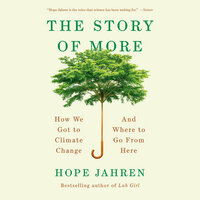You need to sign in or sign up before continuing.
Take a photo of a barcode or cover
467 reviews for:
The Story of More: How We Got to Climate Change and Where to Go from Here
Hope Jahren
467 reviews for:
The Story of More: How We Got to Climate Change and Where to Go from Here
Hope Jahren
disappointed but still want to read her memoir “lab girl”. most of the book is stats on effects of consumerism and the last 25 pages are her “theory” and solutions. but her grand theory after all these stats (which I will get to in a sec) is for people to own their carbon footprint. that’s just so lazy! there are actual solutions out there for transferring our entire electric grid to more sustainable acquisition and more equitable sharing of resources. i am amazed people can still get away with saying things like “do your best to limit plastic and electricity in your own life” and call it a solution to save the world. so disappointed. and then, many stats were oversimplified and could easily misguide a reader who has little background on climate change. also just stylistically i found her anecdotes clunky and difficult to keep track of. i was so excited for this book, but honestly i think it just wasn’t the book for me. this would definitely be better for those just getting started on their journey (as it was intended) and need a quick guide to help them understand the issues.
informative
fast-paced
hopeful
informative
inspiring
reflective
medium-paced
informative
inspiring
fast-paced
Summer reading is actually useful for once.
She truly starts from the beginning of the story. It's not bad, but is very much entry level and at times feels patronizing. Does not engage with settler colonialism or capitalism meaningfully (more readily engages with old school get-people-0ff-land style conservation as a solution), and is not a "how to do better" except in the appendices, where individual action (especially household energy use) is the focus.
Still, I think for some audiences this would be a useful book?
Still, I think for some audiences this would be a useful book?
slow-paced
challenging
hopeful
informative
inspiring
slow-paced
challenging
hopeful
informative
inspiring
reflective
fast-paced
A brisk read on how a small portion of the planet ramped up the exploitation of such a disproportionate percentage of its resources at the expense of others and the environment.
It's primarily aimed at people in OECD (Organisation for Economic Co-operation and Development) countries, and especially USians, who are the people using so much, with tips at the end aimed for the wealthy who have an even bigger responsibility (most of us don't have investment portfolios).
This is because, as the author is very clear, not everyone everywhere bears the same onus -- but the scientific information that makes up the bulk of the text is excellent for anyone.
It's primarily aimed at people in OECD (Organisation for Economic Co-operation and Development) countries, and especially USians, who are the people using so much, with tips at the end aimed for the wealthy who have an even bigger responsibility (most of us don't have investment portfolios).
This is because, as the author is very clear, not everyone everywhere bears the same onus -- but the scientific information that makes up the bulk of the text is excellent for anyone.
informative
informative
inspiring
reflective
fast-paced



